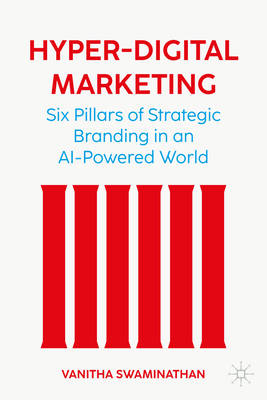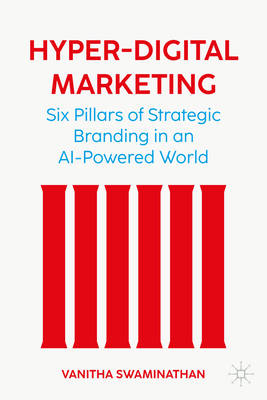
- Retrait gratuit dans votre magasin Club
- 7.000.000 titres dans notre catalogue
- Payer en toute sécurité
- Toujours un magasin près de chez vous
- Retrait gratuit dans votre magasin Club
- 7.000.0000 titres dans notre catalogue
- Payer en toute sécurité
- Toujours un magasin près de chez vous
Hyper-Digital Marketing
Six Pillars of Strategic Brand Marketing in an AI-Powered World
Vanitha Swaminathan
Livre relié | Anglais
62,45 €
+ 124 points
Description
The rapid changes in technology and the rise of AI have heralded the introduction of a new era, which we refer to as the era of hyper-digitalization. This shift has significant impacts on how firms carry out critical functions across various areas, including marketing, information technology, human resources, and others. In marketing, these changes could be far-reaching and have already dramatically impacted many strategic and tactical marketing tasks. We are witnessing the transformation of the marketing function, with many traditional roles of marketers being replaced by new roles that depend heavily on cross-functional coordination with multiple areas. Against this backdrop, this book offers modern marketers a guide on navigating the many changes occurring in organizations. A marketer should understand the concepts presented in this book and be able to handle the demands placed on marketing in the age of AI. This book introduces a new framework with six pillars of modern marketing in the age of hyper-digitalization - purpose, phygital experiences, platform, participation, personalization, and partnerships. Each pillar has its own chapter, which provides specific guidance for marketers on how to implement it. The chapters also demonstrate how each pillar can influence key outcomes like attention and engagement. In the context of hyper-digitalization and AI, the six-pillar framework will help managers navigate current developments and provide marketers with a way to implement changes in the marketing function. It will offer senior marketing strategists and students a framework for marketing that prepares them for the workplace of tomorrow. The framework is supported by numerous case studies and examples (from both the United States and other parts of the world) that demonstrate how these concepts are applied in real-world situations. The book incorporates insights from scholarly research on these topics to provide evidence-based guidance for managers and executives.
Spécifications
Parties prenantes
- Auteur(s) :
- Editeur:
Contenu
- Nombre de pages :
- 249
- Langue:
- Anglais
Caractéristiques
- EAN:
- 9783031956294
- Date de parution :
- 12-10-25
- Format:
- Livre relié
- Format numérique:
- Genaaid
- Dimensions :
- 148 mm x 210 mm

Les avis
Nous publions uniquement les avis qui respectent les conditions requises. Consultez nos conditions pour les avis.






